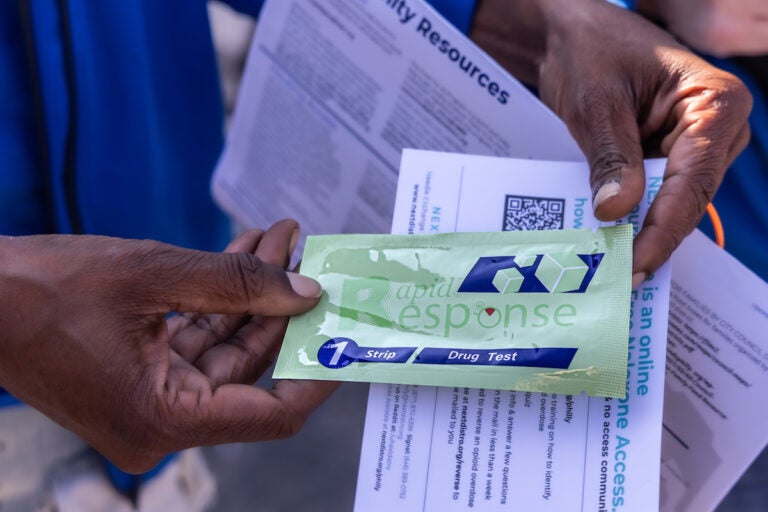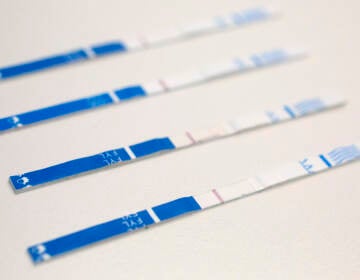Delaware health officials celebrate bright spots in recent drug overdose data
Statistics released earlier this month reveal a slight decrease in overdose deaths for the first time in 10 years.

Opioid crisis resource kits contain test strips used to detect fentanyl and xylazine in street drugs. (Kimberly Paynter/WHYY)
From Philly and the Pa. suburbs to South Jersey and Delaware, what would you like WHYY News to cover? Let us know!
This story was supported by a statehouse coverage grant from the Corporation for Public Broadcasting.
Arlene Wood is the behavioral health grant director at Beebe Healthcare. The hospital system provides mobile health community outreach in Sussex County. Wood said early one morning, the mobile clinic team found a pregnant woman living in a dumpster across from a medical facility.
“She’s in an active addiction. Obviously, she’s homeless, and she didn’t want to go into the facility for treatment,” Wood said. “The peer connected her to resources in Dover and was able to help her get a bus pass. About a week or two later she called the peer and she said, ‘Thank you for saving my life.’ That’s the kind of work that we do in Sussex County, starting at 4:30 a.m.”
Delaware state and community leaders gathered Monday to update the public on the strides they’re making to combat overdose deaths and get people help with their substance use issues. But they also admitted there’s challenges in fighting addiction in the First State.
Preliminary data for the first quarter of 2024 showed that 102 people are suspected of dying of an accidental drug death, compared with 138 overdose deaths for the same period in 2023.
That would be a bright spot after years of continued rises in drug overdoses.
Findings released earlier this month by the Department of Health and Social Services show that overdose deaths have dropped for the first time in a decade from one year to the next. In 2023, there were 527 accidental drug overdose deaths, representing a 1.8% decrease compared to 2022.
“We’ve thrown the kitchen sink at this issue — and we are not stopping anytime soon,” said Lt. Gov Bethany Hall-Long. “It has taken an all-hands-on-deck approach to get this far.”
DHSS data from 2018 to 2022 showed the annual overdose death rate increased an average of 6.5% each year. The state has struggled to contain the spread of deadly narcotics, including fentanyl, cocaine and the animal tranquilizer xylazine. Fentanyl is listed as the cause of death in more than 80% of the accidental overdose deaths over the past several years, according to DHSS data. New Castle County and the City of Wilmington have had the highest overdose rates.
The state has six strategies to combat overdose deaths, said Joanna Champney, director of the Division of Substance Abuse and Mental Health. Those include reducing the negative stigma of addiction, getting more people screened for substance use disorders and blanketing the state with the overdose reversal medication Narcan. DHSS is also reaching out to people experiencing homelessness and focusing on state funding of detox and treatment programs.
“We will not rest until drug poisoning deaths and overdose deaths in our state are at zero,” she said. “But we are grateful for the efforts of all of our partners to continue flattening the curve.”
The timetable for “harm reduction” vending machines to be placed at five sites around the state has been pushed from this spring to early summer, Champney said. These machines will provide items like Narcan and fentanyl and xylazine test strips.
DSAMH is also hoping to recruit a partner to build another state-funded detox facility for low-income individuals and those on Medicaid in Kent or Sussex County.
Currently, people who are uninsured or underinsured must travel to the Kirkwood Highway area in New Castle County to get services at the only state detox facility. Champney said she’s hoping state lawmakers approve a higher reimbursement rate for Fiscal Year 2025, starting in July, which could make it more attractive for a provider to consider a state contract for that type of care.

Get daily updates from WHYY News!
WHYY is your source for fact-based, in-depth journalism and information. As a nonprofit organization, we rely on financial support from readers like you. Please give today.








